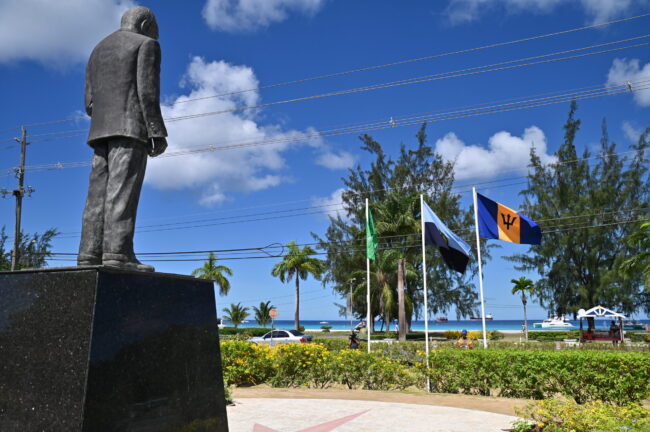Africa and CARICOM Member States Urged to Collaborate for Greater International Influence

September 8, 2023
Africa and Caribbean Community (CARICOM) member states are encouraged to unite for greater influence in international institutions and advocate for the right to development and reparative justice. Initiatives for trade, economic relations, and collaboration are underway between the two regions.
Africa and Caribbean Community (CARICOM) member states must join forces to make greater input in important international policy and decision-making institutions and processes.
That was the call from Acting Prime Minister Dr William Duguid as he addressed those gathered at Government Headquarters on Thursday morning for a flag-raising ceremony to mark the second Africa-CARICOM Day.
“Similarly, Africa and the Caribbean, the African Union (AU) and CARICOM, must join forces to establish as a central principle of international law and policy that the nations and peoples of Africa and the Caribbean are now possessed of a fundamental and non-negotiable right to development with the appropriate assistance. Indeed, this principle is at the very heart of reparative justice, the campaign that we in CARICOM are inviting the AU to join us in,” he added.
Duguid reaffirmed Barbados’ commitment to the initiatives and projects agreed to during the first Africa-CARICOM Heads of Government Summit in 2021 – including upholding and strengthening multilateralism, reforming international financial institutions in order to ensure greater inclusion and equitable representation, lifting unilateral economic sanctions and embargoes against Cuba and Zimbabwe, and pressing for reparative justice – and said more work had to be done to make those a reality.
“Without doubt, this is a very relevant and visionary agenda, but it must be acknowledged that two years on, much still needs to be done to operationalise it. Furthermore, one can argue that events that have taken place over the past two years have made the need for Africa and the Caribbean Community to establish institutions of collaboration and coordination even more compelling. I refer to such events as the constantly deepening security, governance and humanitarian crisis in our Caribbean nation Haiti, as well as the military coup in the West African nation of Niger, and the deadly and tragic civil wars that have so scarred the nations of Ethiopia and Sudan,” he said.
Meanwhile, Director of the CARICOM Single Market and Economy (CSME) Unit Leo Preville touched on the need to drive enhanced trade and economic relations between the two regions.
In an effort to address this, he said exchanges between the CARICOM Secretariat and the African Union Commission have resulted in study proposals on several sectors that have high potential for stimulating trade between Africa and the Caribbean, along with the development of a concept note and terms of reference for a consultancy on a possible future Africa Caribbean Free Trade Area agreement.
“Resetting trade patterns for East-West trade in goods and services between Africa and the Caribbean will be the first challenge to address…. Already, the foundation is being laid for access to capital by the private sector for the Afreximbank. The logical next steps must involve the provision of mechanisms for direct connection within CARICOM and Africa. The investment environment must be made conducive to encourage and facilitate investors and the investments,” Preville said.
“Finalising the CARICOM Investment Policy, inclusive of the incentives agreement, would assume critical importance. There must be a means of facilitating payments for goods and services traded amongst the countries of the two regions. In that regard, it is important that every effort is made to complete the process for possible adoption of the Pan African Payment and Settlement System. This should provide an opportunity for boosting African Caribbean trade and investment,” he added.
Speaking moments before joining Duguid and Preville in watching the flags of the African Union, CARICOM and Barbados being raised, the Dean of the University of the West Indies’ Faculty of Culture, Creative and Performing Arts, Professor David Akombo proposed the idea of “the AU-CARICOM Age of Enlightenment, in which a targeted aim should build a socio-economic, social, cultural and scientific revolution that grows in tandem with the goals already identified or defined by the United Nations”. “The AU-CARICOM Age of Enlightenment should be a period of scientific awakening, centred on the interrogation of the drawbacks that impede the quick realisation of socio-economic development between Africa and CARICOM nations,” he said.
(JB)


